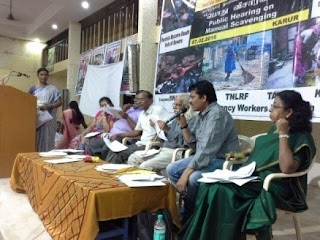
The Hindu Times just published a very interesting article and analysis on India's labour problem. Read the introduction here and follow the link to the full article here.
As the NDA government leans towards industrialists by scripting reforms that would legalise and expand contract labour, the big question is: do India’s trade unions have it in them to resist this imminent legislative blitz?
On February 24, the RSS-affiliated central trade union Bharatiya Mazdoor Sangh (BMS) will hold a nationwide protest against the NDA government’s labour law reforms. On March 10, all the 11 central trade union organisations (CTUOs), including the BMS, will observe a national protest day. And in end-March, they are planning a mass convention on labour policies to mobilise workers. All this comes in the wake of a 15-point pre-Budget memorandum of demands that the CTUOs had submitted to the Union Finance Minister in January.
India’s ‘labour problem’
Ask any top executive from India Inc. and he would tell you that India has a labour problem. And the International Labour Organisation (ILO) would agree. So here’s a quick but unconventional overview of India’s ‘labour problem’.
There are eight core ILO Conventions against forced labour (also known, in less euphemistic times, as slavery). India refuses to ratify four of those: C87 (Freedom of Association and Protection of the Right to Organise Convention); C98 (the Right to Organise and Collective Bargaining Convention); C138 (Minimum Age Convention), and C182 (Worst Forms of Child Labour Convention). India also refuses to ratify another major convention, C131, or the Minimum Wage Fixing Convention. These refusals in themselves present a succinct picture of the status of, as well as the state’s attitude to, labour welfare in India.
The Annual Global Rights Index, published by the International Trade Union Confederation (ITUC), rates 141 countries on 97 indicators derived from ILO standards. The rating is on a scale of 1 to 5-plus, based on the degree of respect accorded to workers’ rights. In 2015, India had a rating of 5, the second-worst category. It denotes “no guarantee of rights”. Despite being a constitutional democracy, on the matter of worker rights, India is in the same club as Saudi Arabia, UAE and Qatar, all dictatorships.
So yes, India certainly has a labour problem. And a reform of the present labour regime is a must. But what form should this reform take?
Follow the link to the full article here.











